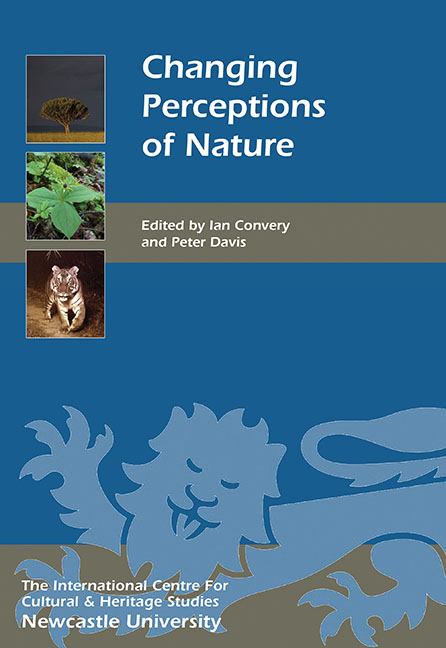Book contents
- Frontmatter
- Contents
- List of Illustrations
- Acknowledgments
- List of Abbreviations
- Foreword
- Introduction
- HISTORICAL PERSPECTIVES ON NATURE
- COLLECTING NATURE
- INTERPRETING NATURE AND LANDSCAPES
- CONSERVING NATURE
- 18 The Public Perception of Protected Areas in the UK
- 19 Conservation of Rare Species and Natural Heritage: the Wild and the Tame
- 20 Our Vanishing Natural Heritage and The Wildlife Trusts: a Century of Influence and Local Action for Nature and People
- 21 A Champion of the Tiger's Cause
- PEOPLE–NATURE INTERACTIONS
- List of Contributors
- Index
- Miscellaneous Endmatter
20 - Our Vanishing Natural Heritage and The Wildlife Trusts: a Century of Influence and Local Action for Nature and People
from CONSERVING NATURE
Published online by Cambridge University Press: 26 October 2017
- Frontmatter
- Contents
- List of Illustrations
- Acknowledgments
- List of Abbreviations
- Foreword
- Introduction
- HISTORICAL PERSPECTIVES ON NATURE
- COLLECTING NATURE
- INTERPRETING NATURE AND LANDSCAPES
- CONSERVING NATURE
- 18 The Public Perception of Protected Areas in the UK
- 19 Conservation of Rare Species and Natural Heritage: the Wild and the Tame
- 20 Our Vanishing Natural Heritage and The Wildlife Trusts: a Century of Influence and Local Action for Nature and People
- 21 A Champion of the Tiger's Cause
- PEOPLE–NATURE INTERACTIONS
- List of Contributors
- Index
- Miscellaneous Endmatter
Summary
The UK's Wildlife Trusts are unusual in the nature conservation world. A federation of forty-seven Trusts focused on the conservation of wildlife, they are not a centralised, top-down organisation but a movement that draws inspiration from the bottom up. They base their collective strength on diversity and wide local experience, bringing a refreshingly independent view to conservation thinking at a county, regional and national level. This chapter shows the part Wildlife Trusts have played in shaping our understanding and approach to wildlife and its conservation and seeks to situate the Wildlife Trusts better within the wider heritage of nature conservation in Britain (Stamp 1969; Sheail 1976; Adams 1986; Evans 1997; Sheail 1998; Simmons 2001; Marren 2002). It is written at a time of growing academic and public recognition of their past role, particularly since their centenary year in 2012, when a commissioned history was published (Sands 2012a).
The Lincolnshire Wildlife Trust, founded as the Lincolnshire Naturalists Trust in 1948 – and more particularly its Honorary Secretary, Edward (Ted) Smith (1920–2015) – was among the first to recognise the need for a new type of local organisation in response to increasingly obvious harmful developments threatening the countryside and wildlife after World War II. Other local Trusts did exist. The Norfolk Naturalists’ Trust (NNT, formed in 1926) (NNT 1976; Stoddart 2013), the West Wales Field Society (formed 1946) and the Yorkshire Trust (1947) were all actively managing nature reserves, but the Lincolnshire Trust sought to spread its net more widely. From the outset, it campaigned successfully to stop a caravan site being developed in the heart of the first Local Nature Reserve in all of England – Gibraltar Point on the Wash (Sheail 1977). Not only was the Lincolnshire Trust acquiring nature reserves and confronting threats from over-development and agriculture but it was also pioneering educational/visitor projects and collaborating closely with the local authority. The extent of its conservation work and outreach within its community were unique. Smith's view was that if this broader approach was good enough for Lincolnshire, it would fit other counties too (Smith 2007). Each should have an ‘independent organisation devoted primarily to conservation, incorporated to hold property, with some financial resources and, most importantly perhaps, deriving its support from a much wider section of community than the average natural history society’ (Society for the Promotion of Nature Reserves 1954).
- Type
- Chapter
- Information
- Changing Perceptions of Nature , pp. 203 - 212Publisher: Boydell & BrewerPrint publication year: 2016



